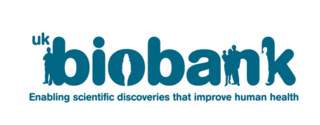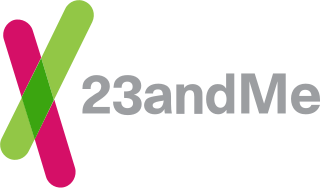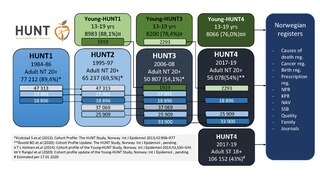The International HapMap Project was an organization that aimed to develop a haplotype map (HapMap) of the human genome, to describe the common patterns of human genetic variation. HapMap is used to find genetic variants affecting health, disease and responses to drugs and environmental factors. The information produced by the project is made freely available for research.

UK Biobank is a large long-term biobank study in the United Kingdom (UK) which is investigating the respective contributions of genetic predisposition and environmental exposure to the development of disease. It began in 2006.
deCODE genetics is a biopharmaceutical company based in Reykjavík, Iceland. The company was founded in 1996 by Kári Stefánsson with the aim of using population genetics studies to identify variations in the human genome associated with common diseases, and to apply these discoveries "to develop novel methods to identify, treat and prevent diseases."
DNA banking is the secure, long term storage of an individual’s genetic material. DNA is most commonly extracted from blood, but can also be obtained from saliva and other tissues. DNA banks allow for conservation of genetic material and comparative analysis of an individual's genetic information. Analyzing an individual's DNA can allow scientists to predict genetic disorders, as used in preventive genetics or gene therapy, and prove that person's identity, as used in the criminal justice system. There are multiple methods for testing and analyzing genetic information including restriction fragment length polymorphism (RFLP) and polymerase chain reactions (PCR).
Genetic discrimination occurs when people treat others differently because they have or are perceived to have a gene mutation(s) that causes or increases the risk of an inherited disorder. It may also refer to any and all discrimination based on the genotype of a person rather than their individual merits, including that related to race, although the latter would be more appropriately included under racial discrimination. Some legal scholars have argued for a more precise and broader definition of genetic discrimination: "Genetic discrimination should be defined as when an individual is subjected to negative treatment, not as a result of the individual's physical manifestation of disease or disability, but solely because of the individual's genetic composition." Genetic Discrimination is considered to have its foundations in genetic determinism and genetic essentialism, and is based on the concept of genism, i.e. distinctive human characteristics and capacities are determined by genes.

Genetic Alliance is a nonprofit organization, founded in 1986 by Joan O. Weiss, working with Victor A. McKusick, to advocate for health benefits in the accelerating field of genomic research. This organization is a network of over 1,000 disease advocacy organizations, universities, government organizations, private companies, and public policy organizations. They aim to advance genetic research agendas toward health benefit by engaging a broad range of stakeholders, including healthcare providers, researchers, industry professionals, public policy leaders, as well as individuals, families and communities. They create programs using a collaborative approach, and aim to increase efficiency and reduce obstacles in genetic research, while ensuring that voices from the involved disease communities are heard. They also promote public policies to advance healthcare. Genetic Alliance provides technical support and informational resources to guide disease-specific advocacy organizations in being their own research advocates. They also maintain a biobank as a central storage facility for several organizations who otherwise would not have the infrastructure to maintain their own repository.

23andMe Holding Co. is a publicly held personal genomics and biotechnology company based in South San Francisco, California. It is best known for providing a direct-to-consumer genetic testing service in which customers provide a saliva sample that is laboratory analysed, using single nucleotide polymorphism genotyping, to generate reports relating to the customer's ancestry and genetic predispositions to health-related topics. The company's name is derived from the 23 pairs of chromosomes in a diploid human cell.

A biobank is a type of biorepository that stores biological samples for use in research. Biobanks have become an important resource in medical research, supporting many types of contemporary research like genomics and personalized medicine.
A biorepository is a facility that collects, catalogs, and stores samples of biological material for laboratory research. Biorepositories collect and manage specimens from animals, plants, and other living organisms. Biorepositories store many different types of specimens, including samples of blood, urine, tissue, cells, DNA, RNA, and proteins. If the samples are from people, they may be stored with medical information along with written consent to use the samples in laboratory studies.
Generation Scotland is a biobank, a resource of biological samples and information on health and lifestyle from thousands of volunteer donors in Scotland.

P3G (Public Population Project in Genomicsand Society) is a not-for-profit international consortium dedicated to facilitating collaboration between researchers and biobanks working in the area of human population genomics. P3G is member-based and composed of experts from the different disciplines in the areas of and related to genomics, including epidemiology, law, ethics, technology, biomolecular science, etc. P3G and its members are committed to a philosophy of information sharing with the goal of supporting researchers working in areas that will improve the health of people around the world.

The Trøndelag Health Study is a cohort health study performed in the Norwegian county of Trøndelag. HUNT is considered one of the most extensive cohort studies ever conducted in any country. The HUNT Research Centre, which is responsible for collecting and providing access to the data and samples from the study, is part of the Faculty of Medicine and Health Sciences at the Norwegian University of Science and Technology (NTNU).
Biobank ethics refers to the ethics pertaining to all aspects of biobanks. The issues examined in the field of biobank ethics are special cases of clinical research ethics.
Privacy for research participants is a concept in research ethics which states that a person in human subject research has a right to privacy when participating in research. Some typical scenarios this would apply to include, or example, a surveyor doing social research conducts an interview with a participant, or a medical researcher in a clinical trial asks for a blood sample from a participant to see if there is a relationship between something which can be measured in blood and a person's health. In both cases, the ideal outcome is that any participant can join the study and neither the researcher nor the study design nor the publication of the study results would ever identify any participant in the study. Thus, the privacy rights of these individuals can be preserved.
CARTaGENE is a population based cohort based on an ongoing and long-term health study of 40, 000 men and women in Québec. It is a regional cohort member of the Canadian Partnership for Tomorrow's Health (CanPath). The project's core mandate is to identify the genetic and environmental causes of common chronic diseases affecting the Québec population. The overall objective from a public health perspective is to develop personalized medicine and public policy initiatives targeting high-risk groups. CARTaGENE is under the scientific direction of Sébastien Jacquemont, Ekaterini Kritikou, and Philippe Broët of the Sainte-Justine Children's Hospital University Health Center. Based in Montréal Québec, Canada, CARTaGENE is operated under the infrastructure of the Sainte-Justine Children's Hospital University Health Center and has seen funding from Genome Canada, the Canadian Foundation for Innovation and Génome Québec and the Canadian Partnership Against Cancer (CPAC) since 2007 among other sources. The program was initially founded by Professors Claude Laberge and Bartha Knoppers, and developed through two phases of participant recruitment under the direction of Professor Philip Awadalla as Scientific Director of the cohort from 2009 to 2015, who is now the National Scientific Director of the Canadian Partnership for Tomorrow's Health (CanPath).
Dynamic consent is an approach to informed consent that enables on-going engagement and communication between individuals and the users and custodians of their data. It is designed to address the many issues that are raised by the use of digital technologies in research and clinical care that enable the wide-scale use, linkage, analysis and integration of diverse datasets and the use of AI and big data analyses. These issues include how to obtain informed consent in a rapidly-changing environment; growing expectations that people should know how their data is being used; increased legal and regulatory requirements for the management of secondary use of data in biobanks and other medical research infrastructure. The approach started to be implemented in 2007 by an Italian group who introduced the ways to have an ongoing process of interaction between researcher and participant where "technology now allows the establishment of dynamic participant–researcher partnerships." The use of digital interfaces in this way was first described as 'Dynamic Consent' in the EnCoRe project. Dynamic Consent therefore describes a personalised, digital interface that enables two-way communication between participants and researchers and is a practical example of how software can be developed to give research participants greater understanding and control over how their data is used. It also enables clinical trial managers, researchers and clinicians to know what type of consent is attached to the use of data they hold and to have an easy way to seek a new consent if the use of the data changes. It is able to support greater accountability and transparency, streamlining consent processes to enable compliance with regulatory requirements.
DNA encryption is the process of hiding or perplexing genetic information by a computational method in order to improve genetic privacy in DNA sequencing processes. The human genome is complex and long, but it is very possible to interpret important, and identifying, information from smaller variabilities, rather than reading the entire genome. A whole human genome is a string of 3.2 billion base paired nucleotides, the building blocks of life, but between individuals the genetic variation differs only by 0.5%, an important 0.5% that accounts for all of human diversity, the pathology of different diseases, and ancestral story. Emerging strategies incorporate different methods, such as randomization algorithms and cryptographic approaches, to de-identify the genetic sequence from the individual, and fundamentally, isolate only the necessary information while protecting the rest of the genome from unnecessary inquiry. The priority now is to ascertain which methods are robust, and how policy should ensure the ongoing protection of genetic privacy.
Catherine Sudlow is a British neurologist. She is a professor of Neurology and Clinical Epidemiology and Head of the Centre for Medical Informatics at the Usher Institute of Population Health Sciences and Informatics at the University of Edinburgh. She is the Chief Scientist of UK Biobank, and an honorary Consultant Neurologist in the Division of Clinical Neurosciences in Edinburgh.
The China Kadoorie Biobank is acquiring genomic data on half a million Chinese participants. In 2022 Genome-wide genotyping had been conducted for more than 100,000 participants using custom-designed Axiom® arrays.





